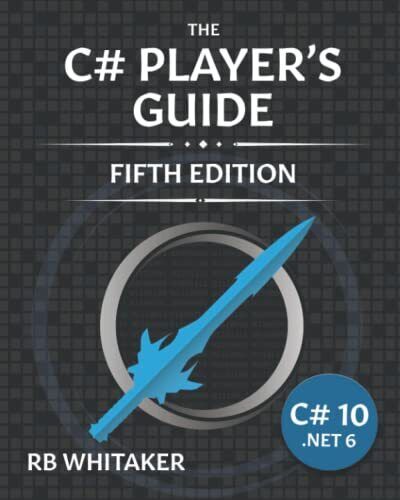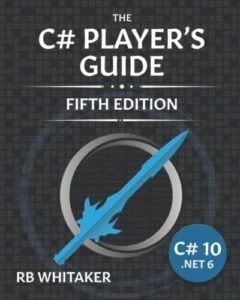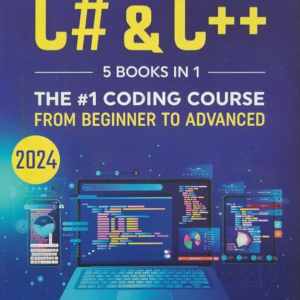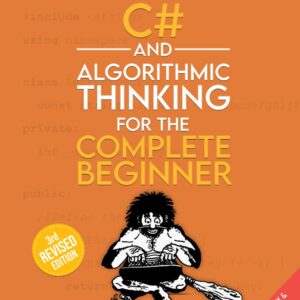If you’re just starting out with programming or looking to level up your coding skills, let me introduce you to a book that honestly feels like it was written with every beginner in mind: The C# Player’s Guide (5th Edition) by RB Whitaker. Whether you’re dreaming of building apps, understanding how software works under the hood, or just trying to dip your toes into the vast world of programming, this book is your one-stop-shop. Let’s dive into why I think this book deserves a prime spot on your desk (or Kindle, if you’re into that digital life).
Why C#?
Okay, so you might be asking yourself: why C#? Great question, and the answer really lies in what you want to do with programming.
C# (pronounced “C-sharp”) is like the modern, sleek cousin in the programming family. It’s user-friendly, powerful, and widely used for building everything from Windows apps to video games (thanks, Unity!). If you’re interested in things like web development or creating software with a nice graphical interface, C# is the perfect choice. Plus, it’s backed by Microsoft, so it’s not going anywhere anytime soon.
Learning C# teaches you not only the language itself but also the broader principles of programming, making it an excellent first language. It strikes a great balance between ease of use and depth of power. Whether you’re a complete beginner or have dabbled in coding before, C# offers a friendly entry point while also scaling up to handle more complex projects.
What can you expect from this Book?
Let’s break this book down. The C# Player’s Guide is designed to take you from zero experience to confidently building your own applications. Each section builds on the last, starting with the absolute basics and gradually introducing more advanced concepts. Here’s what you can expect:
1. Beginner Basics
If you’ve never written a single line of code in your life, don’t sweat it. The first section is all about getting you comfortable with the basics. What is a programming language? How do you write and run code? What the heck is a variable? This section eases you into the world of programming without overwhelming you with jargon or technical mumbo-jumbo.
By the end of this section, you’ll already be writing simple programs that do real things, which is a HUGE confidence boost when you’re just starting out.
2. Core Concepts
This is where things get a little more technical, but don’t worry—the book does a great job of explaining everything step-by-step. You’ll learn how to store information in your programs using variables, what types of data you can work with (like numbers, text, and more), and how to manipulate that data using operators.
You’ll also dive into control flow—things like loops and conditionals—which allow your programs to make decisions and repeat actions. These are the building blocks of any functional program, and the book’s examples make them easy to understand.
3. Object-Oriented Programming (OOP)
OOP might sound intimidating at first, but it’s one of the most important concepts in modern programming. C# is super OOP-friendly, and this book does a fantastic job of breaking it down into digestible pieces.
In simple terms, OOP is all about organizing your code in a way that makes it reusable, efficient, and easy to understand. You’ll learn about classes, objects, inheritance, and all that good stuff. And don’t worry if those words mean nothing to you right now—the book explains everything with clear examples and real-world analogies. By the end of this section, you’ll be able to build programs that are not only functional but also elegant.
4. Advanced Topics
This is where the book really starts flexing its muscles. Once you’ve got the basics down, it’s time to tackle more advanced topics like:
- LINQ: Learn how to query data in a way that’s both powerful and easy to read.
- Asynchronous programming: This is all about running multiple tasks at the same time, which is super important if you’re building apps that need to stay responsive.
- Delegates and events: These advanced features of C# let you write dynamic, flexible code that can respond to user actions and other events.
5. Real-World Applications
This book ties everything together by showing you how to apply what you’ve learned to real-world projects. Want to build a Windows app? There’s guidance for that. Interested in game development? You’ll get an intro to Unity, which is one of the most popular game engines out there.
By the end of this book, you’ll have the skills to build actual software, not just write practice programs. That’s a huge deal because so many beginner books stop short of showing you how to turn your knowledge into something tangible.
Who needs this book?
There are a ton of programming books out there, so what makes this one special? Here are a few things that stood out to me:
1. It’s Beginner-Friendly
Some programming books feel like they were written by robots for other robots. This one doesn’t. The language is casual and approachable, and the explanations are clear without being overly simplified. You can tell the author actually wants you to succeed, not just memorize stuff.
2. Practical Examples
Every concept in the book is backed up by examples you can try out for yourself. There’s nothing worse than reading about something in theory and having no idea how to actually use it. This book makes sure you’re constantly applying what you learn, which is the best way to make it stick.
3. It’s a Long-Term Investment
This isn’t the kind of book you’ll finish in a weekend. It’s designed to grow with you as you progress from beginner to advanced topics. You’ll keep coming back to it as you encounter new challenges in your coding journey.
Who Should Buy This Book?
If you’re a total beginner, this book is perfect for you. It starts from the ground up and doesn’t assume any prior knowledge. But it’s also great for self-taught programmers who want to fill in gaps in their knowledge or take their skills to the next level.
Even if you’re not planning to use C# in your career, learning this language will give you a strong foundation for understanding programming in general. Plus, C# is super useful for web and app development, and it’s a must-know if you’re interested in game development.
– – – – – – O – – – – – –
As someone who started learning to code in college, I wish I’d had this book back then. It would’ve saved me a lot of frustration and late-night Googling. The way The C# Player’s Guide explains concepts is clear, concise, and approachable, making it way more enjoyable to read than most technical manuals.
If you’re serious about learning to code and want a resource that will actually teach you how to build real things, The C# Player’s Guide is a no-brainer. Just make sure to set aside some time because this book is packed with content. It’s not something you’ll skim through in a week—it’s a full-on course.
Programming can feel overwhelming when you’re just starting out, but the right resources make all the difference. The C# Player’s Guide is one of those resources. It’s comprehensive, approachable, and packed with practical advice that will take you from zero to hero. Whether you’re learning for fun, starting a new career, or just trying to understand how computers work, this book has you covered.








Reviews
There are no reviews yet.